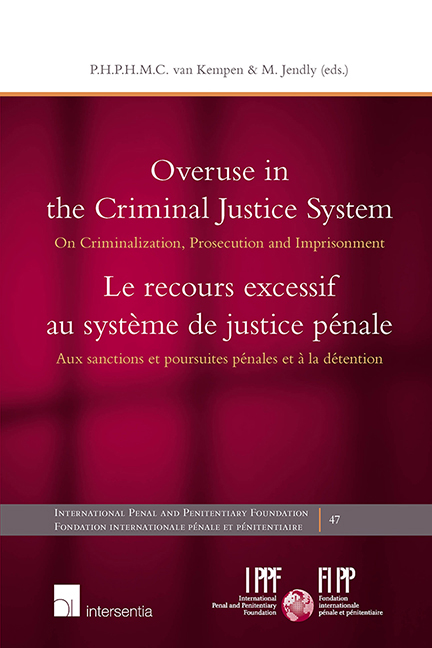Book contents
- Frontmatter
- Dedication
- Contents
- Acknowledgements
- Remerciements
- PART I INTRODUCTORY SYNTHESIS AND ANALYSES 1ÈRE PARTIE. SYNTHÈSE ET ANALYSES INTRODUCTIVES
- PART II THEMES 2ÈME PARTIE. THÈMES
- PART III NATIONAL REPORTS 3ÈME PARTIE. RAPPORTS NATIONAUX
- Overuse in the Criminal Justice System in Argentina
- Le recours au système de justice pénale en Belgique: état des lieux et perspectives
- Overuse of Criminal Law in Finland
- Overuse in the Criminal Justice System in Germany
- Overuse in the Criminal Justice System in Greece
- Overusing the Criminal Justice System: the Case of Ireland
- Overuse in the Criminal Justice System in Japan
- Tendencies of Overuse in Criminal Law Policy and Criminal Law Enforcement in the Netherlands
- Overuse in the Criminal Justice System in New Zealand
- Overuse in the Criminal Justice System in Nigeria
- Overuse in the Criminal Justice System in Poland
- Overuse in the Russian Criminal Justice System
- Overuse in the Criminal Justice System in Spain
- Recourt-on de manière excessive au système pénal en Suisse?
- Overuse of the Criminal Justice System in Taiwan
- Overuse and Underuse of the United States Criminal Justice System in the Area of Business Crimes
- The International Penal and Penitentiary Foundation: history and purpose
- La Fondation internationale pénale et pénitentiaire: histoire et objectif
- The IPPF Series
Overuse in the Criminal Justice System in New Zealand
from PART III - NATIONAL REPORTS 3ÈME PARTIE. RAPPORTS NATIONAUX
Published online by Cambridge University Press: 26 June 2019
- Frontmatter
- Dedication
- Contents
- Acknowledgements
- Remerciements
- PART I INTRODUCTORY SYNTHESIS AND ANALYSES 1ÈRE PARTIE. SYNTHÈSE ET ANALYSES INTRODUCTIVES
- PART II THEMES 2ÈME PARTIE. THÈMES
- PART III NATIONAL REPORTS 3ÈME PARTIE. RAPPORTS NATIONAUX
- Overuse in the Criminal Justice System in Argentina
- Le recours au système de justice pénale en Belgique: état des lieux et perspectives
- Overuse of Criminal Law in Finland
- Overuse in the Criminal Justice System in Germany
- Overuse in the Criminal Justice System in Greece
- Overusing the Criminal Justice System: the Case of Ireland
- Overuse in the Criminal Justice System in Japan
- Tendencies of Overuse in Criminal Law Policy and Criminal Law Enforcement in the Netherlands
- Overuse in the Criminal Justice System in New Zealand
- Overuse in the Criminal Justice System in Nigeria
- Overuse in the Criminal Justice System in Poland
- Overuse in the Russian Criminal Justice System
- Overuse in the Criminal Justice System in Spain
- Recourt-on de manière excessive au système pénal en Suisse?
- Overuse of the Criminal Justice System in Taiwan
- Overuse and Underuse of the United States Criminal Justice System in the Area of Business Crimes
- The International Penal and Penitentiary Foundation: history and purpose
- La Fondation internationale pénale et pénitentiaire: histoire et objectif
- The IPPF Series
Summary
INTRODUCTION
In recent years, New Zealand has seen a decline in both recorded crime and the number of prosecutions. However, in the same period, the prison population has continued to climb. In this chapter, we examine the reasons for New Zealand's high per capita prison population and illustrate that attempts to reduce prosecution have not filtered through to affect rates of imprisonment.
In Part II, we outline the trend of a declining crime rate over the last decade, and note that criminalisation is almost exclusively reserved for behaviour involving harm to individuals or the community. However, the rate of real crime is almost certainly much higher than the numers recorded, as is illustrated in victim surveys conducted by the Government. In common with comparable jurisdictions such as England and Wales, there has been an increase in quasicriminal offences and orders over the past decade, and we examine two examples of these. These alternatives to criminalisation sit alongside police practice and discretion, which allow for tolerance in areas such as the possession of illicit drugs.
New Zealand's expedience-based prosecution process contains no centralised prosecution service, but instead relies on the police to initiate most prosecutions.
In Part III we examine prosecution trends and the offences prosecuted in the greatest numbers, as well as the process of prosecutions for both minor and more serious offences. Since 2010, greater efforts have been made by New Zealand Police to consider alternatives to prosecution, but we argue that these have had little impact on the prison population or on rates of imprisonment.
In Part IV, we argue that the overuse of imprisonment in New Zealand can be seen to be a result of longer nominal and effective sentences imposed. This in turn has been driven by both government policy and the public mood, as affected by the media and pressure groups. Alongside a high per capita prison prison population sits an extensive system of non-custodial penalties. Despite some restrictions, in general judges have a relatively wide discretion when imposing sentences. We conclude by noting the rather blunt mechanisms open to Government to reduce imprisonment in the current system and the consequent likelihood of continued overuse of imprisonment in New Zealand.
- Type
- Chapter
- Information
- Overuse in the Criminal Justice SystemOn Criminalization, Prosecution and Imprisonment, pp. 449 - 480Publisher: IntersentiaPrint publication year: 2019



